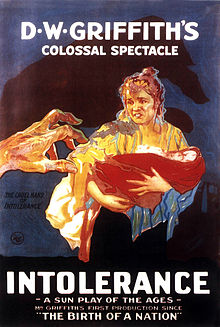Intolerance (film)
| Intolerance | |
|---|---|

Theatrical poster
|
|
| Directed by | D. W. Griffith |
| Produced by | D. W. Griffith |
| Written by | D. W. Griffith Hettie Grey Baker Tod Browning Anita Loos Mary H. O'Connor Frank E. Woods |
| Starring |
Vera Lewis Ralph Lewis Mae Marsh Robert Harron Constance Talmadge Lillian Gish Josephine Crowell Margery Wilson Frank Bennett Elmer Clifton Miriam Cooper Alfred Paget |
| Music by |
Joseph Carl Breil Julián Carrillo Carl Davis (for 1989 restoration) |
| Cinematography | Billy Bitzer |
| Edited by | D. W. Griffith James Smith Rose Smith |
| Distributed by | Triangle Distributing Corporation |
|
Release date
|
September 5, 1916 |
|
Running time
|
210 minutes (original release) 197 minutes (most surviving cuts) |
| Country | United States |
| Language | Silent film English intertitles |
| Budget | $385,907 |
Intolerance is a 1916 epic silent film directed by D. W. Griffith. Subtitles include Love's Struggle Throughout the Ages and A Sun-Play of the Ages.
Widely regarded as one of the great masterpieces of the silent era, as well as one of the first art films, the three-and-a-half-hour epic intercuts four parallel storylines, each separated by several centuries: (1) a contemporary melodrama of crime and redemption, (2) a Judean story: Christ's mission and death, (3) a French story: the events surrounding the St. Bartholomew's Day massacre of 1572, and (4) a Babylonian story: the fall of the Babylonian Empire to Persia in 539 BC. Each story had its own distinctive color tint in the original print. The scenes are linked by shots of a figure representing Eternal Motherhood, rocking a cradle.
Intolerance was made partly in response to criticism of Griffith's previous film, The Birth of a Nation (1915), which was criticized by the NAACP and other groups as perpetuating racial stereotypes and glorifying the Ku Klux Klan. It was not, as is commonly implied, an apology for the racism of his earlier film. In numerous interviews, Griffith made clear that the film's title and overriding themes were meant as a response to those who he felt had been intolerant of him in condemning The Birth of a Nation. In the years following its release, Intolerance would strongly influence European film movements despite its lack of commercial success domestically.
This complex film consists of four distinct, but parallel, stories—intercut with increasing frequency as the film builds to a climax—that demonstrate mankind's persistent intolerance throughout the ages. The film sets up moral and psychological connections among the different stories. The timeline covers approximately 2,500 years.
Breaks between the differing time periods are marked by the symbolic image of a mother rocking a cradle, representing the passing of generations. The film simultaneously cross-cuts back and forth and interweaves the segments over great gaps of space and time, with over 50 transitions between the segments. One of the unusual characteristics of the film is that many of the characters do not have names. Griffith wished them to be emblematic of human types. Thus, the central female character in the modern story is called The Dear One. Her young husband is called The Boy, and the leader of the local Mafia is called The Musketeer of the Slums. Critics and film theorists maintain that these names reveal Griffith's sentimentalism, which was already hinted at in The Birth of a Nation, with names such as The Little Colonel.
...
Wikipedia
